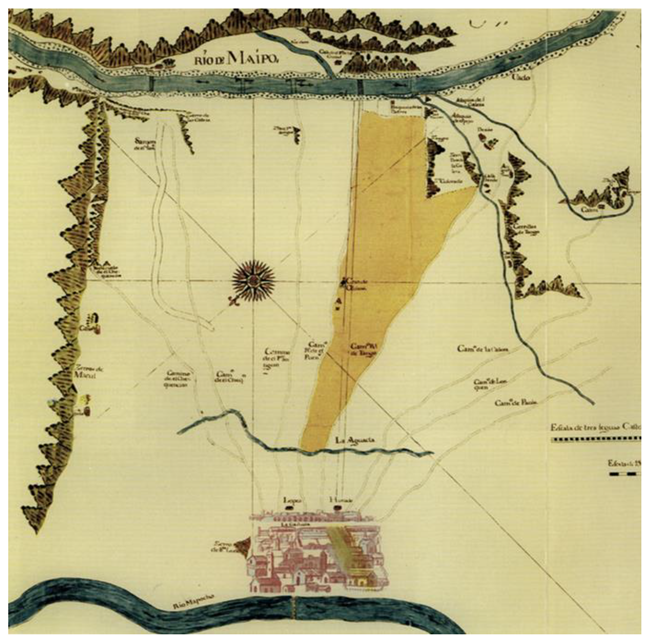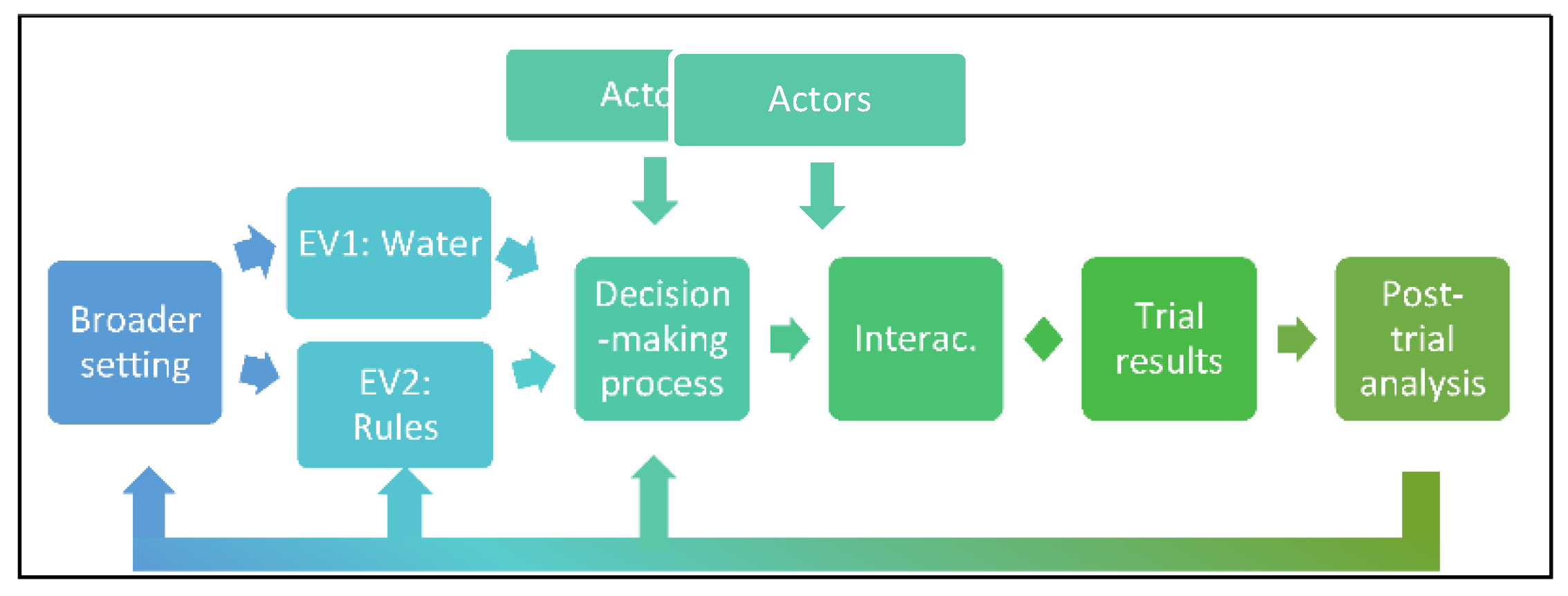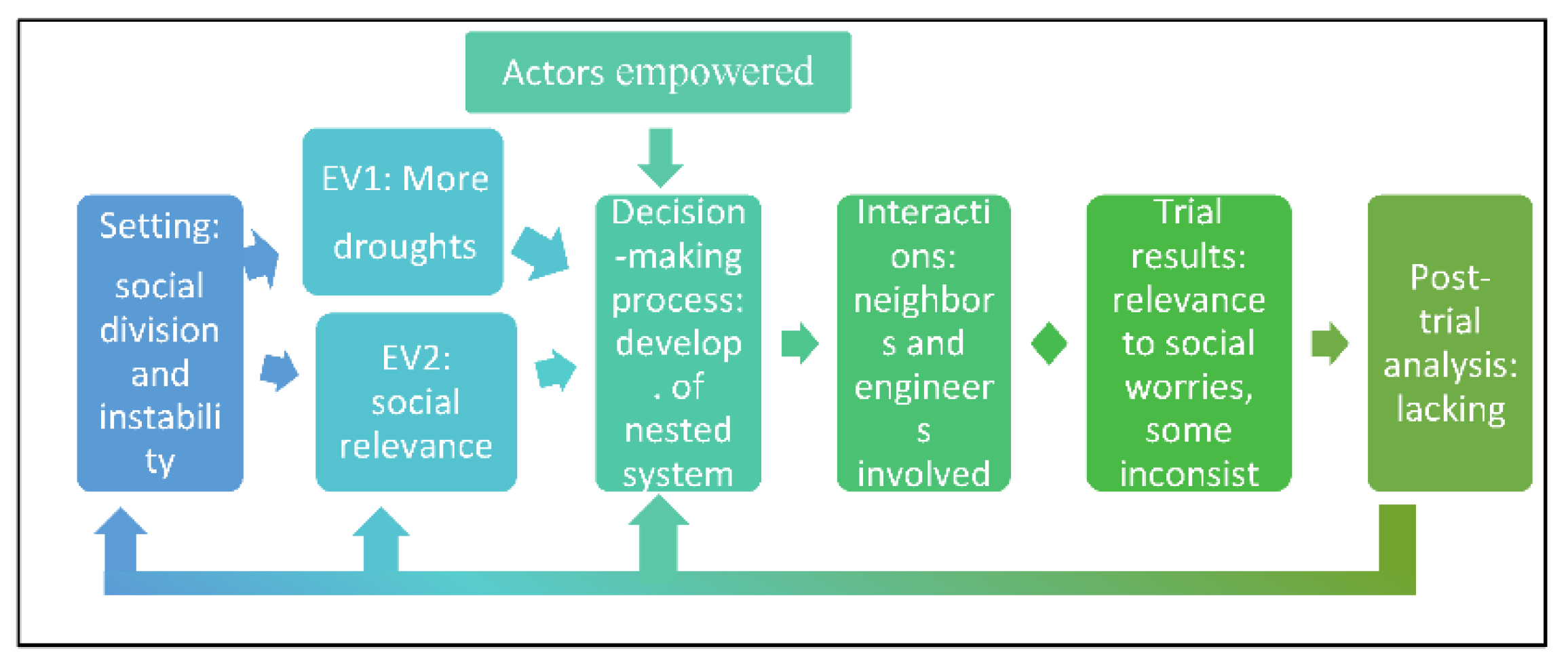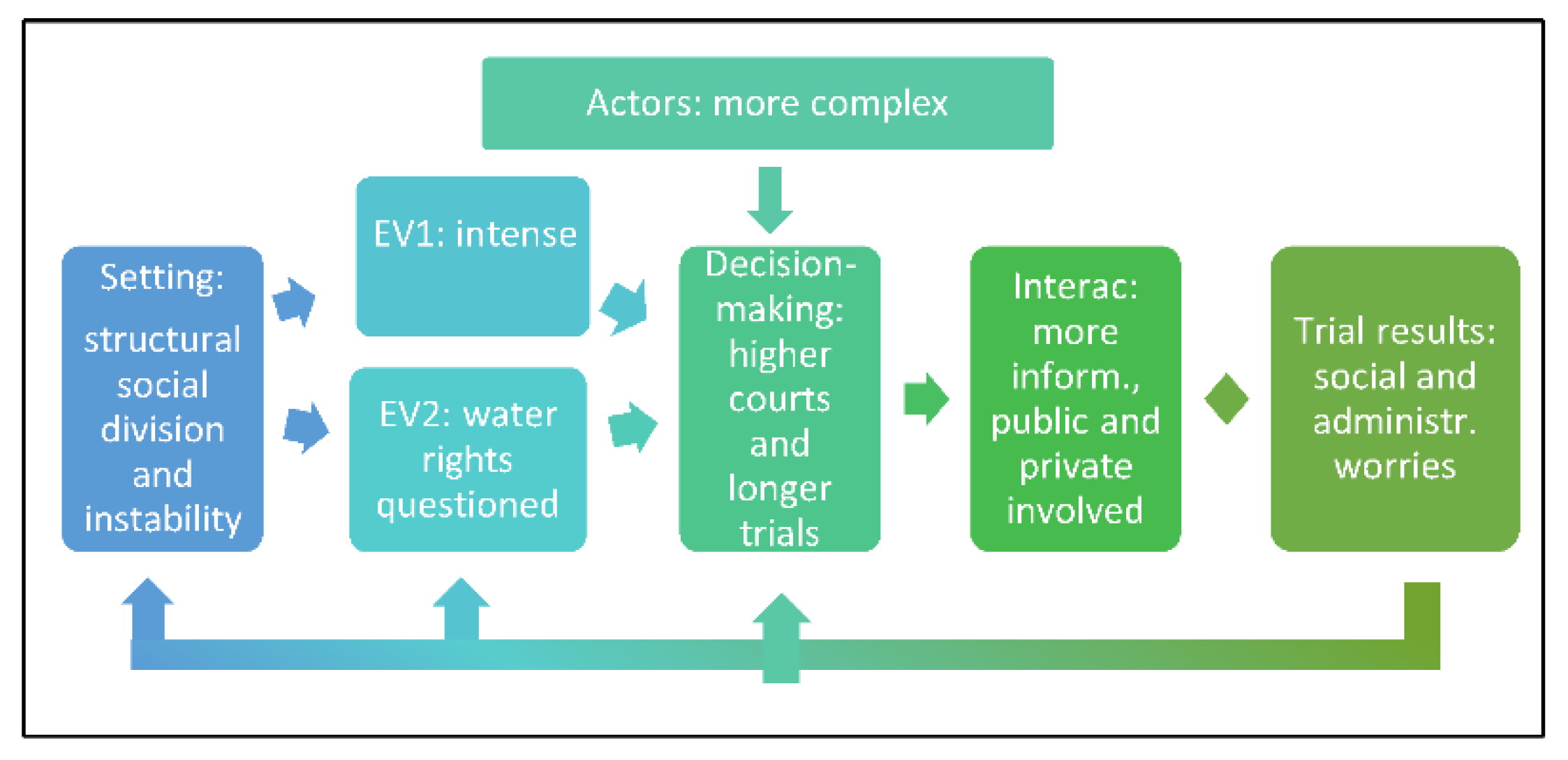Submitted:
19 July 2023
Posted:
21 July 2023
You are already at the latest version
Abstract
Keywords:
1. Introduction: Chilean water conflict resolution and its origin, a big uncertainty
2. Conceptual Framework, Data and Methodology

3. Results: what do the trials reveal regarding water conflict resolution during colonial times?
3.1. Broader Setting: trials reveal value for social issues
3.2. In a context of water scarcity, conflicts for water were becoming violent
3.3. Guiding principles, topics of conflicts and rulings adapted towards local needs
3.4. Actors, the decision-making process and their interactions
- The Judges or Deliberative bodies
- The Cabildo as representative of the People
- Other public authorities
3.5. Trial results: Contradictions, innovations and sanctions
3.6. Post-trial analysis: lack of evaluation
4. Discussion: Have we learned anything from colonial times?
4.1. Environmental issues have risen, while social ones persist
4.2. More complex topics have risen
4.3. The judicial system and its timing: length of trials has increased
4.4. Plaintiffs: changes in the ones doing the claims
4.5. Actors: fragmentation has led to discoordination and disparity in the treatment and resolution of water conflicts and trust issues
5. Conclusion: Effective water conflict resolution schemes
Funding
Acknowledgments
Conflicts of Interest
Appendix A

| 1 | Besides the Ordinary Courts of Justice, water cases can also go to the Free Competition Court (Tribunal de Defensa a la Libre Competencia, TDLC); Arbitrage Courts (Tribunales Arbitrales, TA) and Environmental Courts. |
| 2 | For example, according to the Castilian legal tradition, the Indian Law established that the pastures, mountains and waters common in the Indias were common to all their neighbors (Zamora and Camino, 1844). According to the Spanish colonies, the neighbors were members of their own colonies, they established the limits of their own properties and granted themselves volumes of water (merced) as rights of use, ignoring previous settlers. |
| 3 | The Royal Hearing was originally developed in Concepción and worked from the years 1567 to 1575. It then closed and was reopened in Santiago in 1609 and worked continuously until 1811. It was later reinstalled in 1814, but then definitively closed in 1818. |
| 4 | Law 20,600, published on June 28, 2012. |
| 5 | Water Code 1981, Art. 244 |
| 6 | Huasco River Hydroelectric Power Plant: https://www.riohuasco.cl/hidroelectrica-rio-huasco-s-a/
|
References
- Martín, L.; Justo, J.B. Análisis, Prevención y Resolución de Conflictos Por El Agua En América Latina y El Caribe. Serie Recursos Naturales y Desarrollo, CEPAL 2015, 171, 62. [Google Scholar]
- Ganoulis, J. Water Security in the Anthropocene: A Dialectical Water–Man Interaction Model. Sustainability (Switzerland) 2022, 14. [Google Scholar] [CrossRef]
- Saravia Matus, S.; Gil, M.; Blanco, E.; Llavona, A.; Naranjo, L. Desafíos Hídricos En Chile y Recomendaciones Para El Cumplimiento Del ODS 6 En América Latina y El Caribe. Serie Recursos Naturales y Desarrollo, CEPAL 2020, 198, 77. [Google Scholar]
- Herrera, M.; Candia, C.; Rivera, D.; Aitken, D.; Brieba, D.; Boettiger, C.; Donoso, G.; Godoy-Faúndez, A. Understanding Water Disputes in Chile with Text and Data Mining Tools. Water Int 2019, 44, 302–320. [Google Scholar] [CrossRef]
- Donoso, G. Water Policy in Chile; Springer, 2018. [Google Scholar]
- Angelakis, A.N.; Valipour, M.; Ahmed, A.T.; Tzanakakis, V.; Paranychianakis, N.V.; Krasilnikoff, J.; Drusiani, R.; Mays, L.; El Gohary, F.; Koutsoyiannis, D.; et al. Water Conflicts: From Ancient to Modern Times and in the Future. Sustainability (Switzerland) 2021, 13. [Google Scholar] [CrossRef]
- Rivera, D.; Godoy-Faúndez, A.; Lillo, M.; Alvez, A.; Delgado, V.; Gonzalo-Martín, C.; Menasalvas, E.; Costumero, R.; García-Pedrero, Á. Legal Disputes as a Proxy for Regional Conflicts over Water Rights in Chile. J Hydrol (Amst) 2016. [Google Scholar] [CrossRef]
- Rivera, D.; Del Río, C.; Donoso, G.; Molinos-Senante, M. Conflictividad Judicial de Aguas En Chile: Caracterización y Propuestas Para Mejorar Su Prevención y Resolución. Propuestas para Chile 2019. Centro de Políticas Públicas UC 2020. [Google Scholar]
- Engler, A.; Melo, O.; Rodríguez, F.; Peñafiel, B.; Jara-Rojas, R. Governing Water Resource Allocation: Water User Association Characteristics and the Role of the State. Water 2021, 13, 2436. [Google Scholar] [CrossRef]
- Donoso, G. Water Markets: Case Study of Chile’s 1981 Water Code. Cienc Investig Agrar 2006, 33, 157–171. [Google Scholar] [CrossRef]
- Camus, P.; Castillo, S.; Muñoz, E. Mecanismos de Apropiación, Sistema de Administración y Resolución de Conflictos Por El Uso de Los Sistemas de Riego En Una Sociedad Colonial. Revista de Historia y Geografía Universidad Católica Silva Henriquez 2019, 24. [Google Scholar]
- Stewart, D. El Derecho de Aguas En Chile; Editorial Jurídica de Chile: Santiago, Chile, 1970. [Google Scholar]
- Wobeser, G. von Surgimiento y Consolidación de La Hacienda. In La formación de la hacienda en la época colonial. El uso de la tierra y el agua; 1989; ISBN 9789688370261. [Google Scholar]
- Dougnac, A.; Barrientos, J. El Derecho de Aguas a Través de La Jurisprudencia Chilena de Los Siglos XVII y XVIII. Revista de Estudios Histórico-Jurídicos 1991, XIV, 101–136. [Google Scholar]
- Dougnac, A. Manual de Historia Del Derecho Indiano; Instituto de Investigaciones Jurídicas, UNAM: México, 1994. [Google Scholar]
- Palerm-Viqueira, J. A Comparative History, from the 16th to 20th Centuries, of Irrigation Water Management in Spain, Mexico, Chile, Mendoza (Argentina) and Peru. Water Policy 2010. [CrossRef]
- Arévalo, G. Comunidades de Aguas Subterráneas: Dificultades En Su Organización y Ejercicio. Actas de Derecho de Aguas 2013, 185–194. [Google Scholar]
- Vergara, A. Las Aguas Como Bien Público (No Estatal) y Lo Privado En El Derecho Chileno: Evolución Legislativa y Su Proyecto de Reforma. Revista Derecho Administrativo Económico 2017, 63, 79. [Google Scholar] [CrossRef]
- Lira, P.; Maza, L. Régimen Legal de Las Aguas En Chile; Editorial Nascimento: Santiago, 1940. [Google Scholar]
- Castillo, S. El Río Mapocho y Sus Riberas. Espacio Público e Intervención Urbana En Santiago de Chile (1885-1918); 2014. [Google Scholar]
- Piwonka, G. Las Aguas de Santiago de Chile, 1541-1999; Editorial Universitaria, 1999; ISBN 956-244-102-4. [Google Scholar]
- Piwonka, G. Regulación Cuántica y Jurídica de Las Aguas En Chile: El Debate En Torno al Regador Chileno. Revista Derecho Administrativo Económico 2000, 433–450. [Google Scholar] [CrossRef]
- Kiser, L.L.; Ostrom, E. The Three Worlds of Action: A Metatheoretical Synthesis of Institutional Approaches. In Strategies of Political Inquiry; 1982; pp. 179–222. [Google Scholar]
- McGinnis, M.D. An Introduction to IAD and the Language of the Ostrom Workshop: A Simple Guide to a Complex Framework. Policy Studies Journal 2011. [Google Scholar] [CrossRef]
- Ostrom, E. Background on the Institutional Analysis And. Policy Studies Journal 2011, 39, 7–27. [Google Scholar] [CrossRef]
- Ostrom, E. A Diagnostic Approach for Going beyond Panaceas. Proc Natl Acad Sci U S A 2007, 104, 15181–15187. [Google Scholar] [CrossRef]
- Ostrom, E.; Janssen, M.A.; Anderies, J.M. Going beyond Panaceas. Proc Natl Acad Sci U S A 2007, 104, 15176–15178. [Google Scholar] [CrossRef]
- McGinnis, M.D. Networks of Adjacent Action Situations in Polycentric Governance. Policy Studies Journal 2011, 39, 51–78. [Google Scholar] [CrossRef]
- Villamayor-Tomas, S.; Grundmann, P.; Epstein, G.; Evans, T.; Kimmich, C. The Water-Energy-Food Security Nexus through the Lenses of the Value Chain and the Institutional Analysis and Development Frameworks. Water Alternatives 2015, 8, 735–755. [Google Scholar]
- Villamayor-Tomas, S.; Thiel, A.; Amblard, L.; Zikos, D.; Blanco, E. Diagnosing the Role of the State for Local Collective Action: Types of Action Situations and Policy Instruments. Environ Sci Policy 2019, 97, 44–57. [Google Scholar] [CrossRef]
- Meinzen-Dick, R. Beyond Panaceas in Water Institutions. Proc Natl Acad Sci U S A 2007. [Google Scholar] [CrossRef]
- Zhang, Y. How Did the Lost Shangri-La Get Lost? The Tragedy of the Groundwater Commons in Lijiang, China. Water (Basel) 2020, 12. [Google Scholar] [CrossRef]
- Blanco, E.; Donoso, G. Drivers for Collective Groundwater Management: The Case of Copiapó, Chile. In Global Water Security Issues (GWSI) 2020 Theme: The role of sound groundwater resources management and governance to achieve water security; Choi, S.H., Shin, E., Makarigakis, A.K., Sohn, O., Clench, C., Trudeau, M., Eds.; UNESCO, International Centre for Water Security and Sustainable Management, 2021; pp. 59–75. ISBN 978-92-3-100468-1. [Google Scholar]
- González, C. El Abogado y El Procurador de Pobres: La Representación de Esclavos y Esclavas a Fines de La Colonia y Principios de La República 1 The Lawyer and Solicitor of the Poors: The Representation of Slaves in the Late Colonial and Republican Periods. SudHistoria 2012, 5, 81–98. [Google Scholar]
- Arroyo, D.I. Las Asociaciones de Usuarios de Agua En Chile Durante El Siglo XIX y Primera Mitad Del Siglo XX: 1800-1950; Facultad de Derecho, Universidad de Chile: Santiago, 2009. [Google Scholar]
- DGA Actualización Del Balance Hídrico Nacional. Ministerio de Obras Públicas, Dirección General de Aguas, División de Estudios y Planificación, Santiago, Chile, Realizado por: Universidad de Chile y Pontificia Universidad Católica de Chile 2017, SIT N° 417, 378.
- Escenarios Hídricos 2030. Radiografía Del Agua: Brecha y Riesgo Hídrico En Chile. Santiago, Chile, 2018. [Google Scholar]
- CR2. Informe a La Nación: La Megasequía En Chile La Megasequía 2010-2019: Una Lección Para El Futuro; 2019. [Google Scholar]
- Larrain, S.; Poo, P. Conflictos Por El Agua En Chile: Entre Los Derechos Humanos y Las Reglas Del Mercado. Larraín, S., Poo, P., Eds.; Chile Sustentable, 2010; ISBN 9789567889426. [Google Scholar]
- Carranza, D.M.; Varas-Belemmi, K.; De Veer, D.; Iglesias-Müller, C.; Coral-Santacruz, D.; Méndez, F.A.; Torres-Lagos, E.; Squeo, F.A.; Gaymer, C.F. Socio-Environmental Conflicts: An Underestimated Threat to Biodiversity Conservation in Chile. Environ Sci Policy 2020, 110, 46–59. [Google Scholar] [CrossRef]
- Hernández, M. 65% de Causas de Primer Tribunal Ambiental Por Temas Agua. Available online: https://www.mch.cl/2021/03/23/65-de-causas-de-primer-tribunal-ambiental-han-estado-asociadas-a-problematicas-de-agua/# (accessed on 11 October 2022).
- Bauer, C.J. Water Conflicts and Entrenched Governance Problems in Chile’s Market Model. Water Alternatives 2015. [Google Scholar]
- Rinaudo, J.D.; Donoso, G. State, Market or Community Failure? Untangling the Determinants of Groundwater Depletion in Copiapó (Chile). Int J Water Resour Dev 2019, 35, 283–304. [Google Scholar] [CrossRef]
- Popovici, R.; Ma, Z.; Erwin, A.E.; Prokopy, L.S.; Zeballos Velarde, C.R.; Bocardo Delgado, E.F.; Pinto Cáceres, J.P. Maladaptive Learning in Peru’s Integrated Water Resources Management. Environ Sci Policy 2022, 127, 209–217. [Google Scholar] [CrossRef]
- Peña, H. Integrated Water Resources Management in Chile: Advances and Challenges. In Water Policy in Chile; Donoso, G., Ed.; Springer, 2018; pp. 197–207. [Google Scholar]
- Rojas, C. Autogestión y Autorregulación Regulada de Las Aguas: Organizaciones de Usuario de Aguas (OUA) y Juntas de Vigilancia de Ríos. Ius et Praxis 2014, 20, 123–162. [Google Scholar] [CrossRef]
- World Bank Estudio Para El Mejoramiento Del Marco Institucional Para La Gestión Del Agua. Departamento del Medio Ambiente y Desarrollo Sostenible; Chile, 2013. [Google Scholar]
- Puig, A. El Fortalecimiento de Las Organizaciones de Usuarios Para Una Gestión Integrada de Los Recursos Hídricos; 1999. [Google Scholar]
- Dipierri, A.A.; Zikos, D. The Role of Common-Pool Resources’ Institutional Robustness in a Collective Action Dilemma under Environmental Variations. Sustainability (Switzerland) 2020, 12, 1–21. [Google Scholar] [CrossRef]
- World Bank Diagnóstico de La Gestión de Los Recursos Hídricos. Departamento del Medio Ambiente y Desarrollo Sostenible; Chile, 2011. [Google Scholar] [CrossRef]



Disclaimer/Publisher’s Note: The statements, opinions and data contained in all publications are solely those of the individual author(s) and contributor(s) and not of MDPI and/or the editor(s). MDPI and/or the editor(s) disclaim responsibility for any injury to people or property resulting from any ideas, methods, instructions or products referred to in the content. |
© 2023 by the authors. Licensee MDPI, Basel, Switzerland. This article is an open access article distributed under the terms and conditions of the Creative Commons Attribution (CC BY) license (http://creativecommons.org/licenses/by/4.0/).




